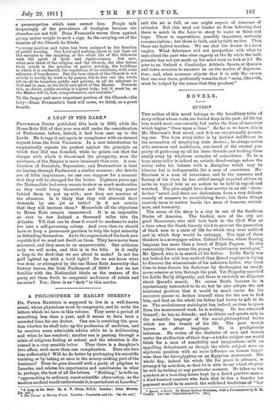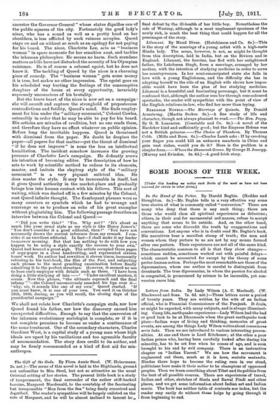NOVELS.
Q17EED.s
THE author of this novel belongs to the hereditary tribe of story-tellers whose roots are buried deep in the past; all life for him would most conveniently fall under the form of narrative which begins " Once upon a time." So far as we know, this is Mr. Harrison's first novel, and it is an exceptionally promis- ing one. The born story-teller is by instinct indifferent to the accusation of employing stale devices ; he always writes with sureness and confidence, convinced of the eternal pro- priety of gathering up all his loose threads and tucking them neatly away by whatever miracles of coincidence. To be a born story-teller is indeed an artistic disadvantage unless the writer rules his talents with a discipline which may be irksome but is indispensable for a man of conscience. Mr. Harrison is a man of conscience, and to the sureness and fluency of his class be has added enough acquired virtues to make us regard him as an author to be held in regard and watched. The plot might have done service in an old " three- decker " novel, and there are declensions from a very delicate comedy of manners to unsatisfying farce ; but these things scarcely seem to matter beside the mass of humour, wistful- ness, and humanity.
The scene of the story is a city in one of the Southern States of America. The leading men of the city are good Democrats, who still look back to the Civil War as a time when the South bravely tried to prevent the promotion of black men to a state of life for which they were unfitted and in which they would be unhappy. The type of these thinkers is a newspaper editor, Colonel Cowles, whose flaming language has more than a touch of Elijah Pogram. To this community there comes the young "evolutionary sociologist," Mr. Queed, who is in search of his father. Little Em'ly was not looked for with lees method than Queed employs in trying to discover the whereabouts of his unknown father, who from time to time directs his footsteps by discharging an anony- mous missive at him through the post. Yet Peggotty searched for Little Em'ly diligently, and there is certainly no diligence about Queed's search. He comes South because he is mysteriously instructed to do so, but he also adopts the not irrational position that it would be much easier for his eccentric parent to declare himself than for his son to find him, and that on the whole his father had better be left to do so. The evolutionary sociologist has, indeed, no time to spare from the monumental work he is writing. He has educated himself ; he has no friends ; and he thinks and speaks only in the scientific language of the social-philosophical books which are the breath of his life. The poor wretch knows no other language. He is prodigiously inhuman. He writes of the destinies of men and women under the civilization of their day—a tender subject one would think for a man of sensibility and imagination—with an appalling detachment, as though the whole subject were an algebraic problem with no more influence on human happi- ness than the hieroglyphics on an Egyptian monument. His whole day, indeed his whole life for years in advance, is arranged by schedule, so that be is able to say which chapter he will be writing at any particular moment. He takes up his quarters at a boarding-house kept by a faded gentlewc man- e kind-hearted creature who feels that to dun a boarder for payment would be to smirch the well-bred traditions of " her • Queed : a Bawl. By Henry Sydnor Harrison, with a Frontiardeoe by R. M. Crosby. Lone on s Constable and Co. Os.]
ancestor the Governor-General" whose statue dignifies one of the public squares of the city. Fortunately the good lady's niece, who has a sound as well as a pretty head on her shoulders, is less afflicted by such ruinous scruples. Queed stays on and on without so much as an apology for not paying for his board. The niece, Charlotte Lee, acts as "business woman" in spare moments for her sensitive aunt, and tackles the inhuman philosopher. He means no harm. Such mundane matters as bills have not disturbed the serenity of his Olympian existence. He is of course a colossal egoist, but be does not know it. The tackling of Queed by the niece is a charming piece of comedy. The "business woman" gets some money it is true, but makes no other impression. The egoist goes on his scheduled way hurting the feelings of the consumptive daughter of the hoUse at every opportunity, invariably supremely unconscious of his brutality.
But the brave heart of the niece is now set on a campaign: she will assault and capture the stronghold of preposterous contradictions and futility, Queed's mind. She finds employ- thent for him under the "military economist," Colonel Cowles, ostensibly in order that he may be able to pay for his board. His articles are miracles of erudition, but no one reads them, and therefore they have no effect whatever on public opinion. Before long the inevitable happens. Queed is threatened with dismissal from the paper. No doubt he despises the paper—all papers for that matter—yet the threat of dismissal "if he does not improve" is none the less an intellectual humiliation. The incident somehow increases the growing pressure of Charlotte Lee's campaign. He defiantly avows his intention of becoming editor. The description of how he sets to work by scientific method to reduce to its elements, master, and imitate the claptrap style of the "military
economist " is a very piquant satirical idea. He does master the style. It may be inexcusable in itself, but it gives Queed authority in the market-place and gradually brings him into human contact with his fellows. This sort of
writing, which was dashed of in a few minutes by the Colonel, cost Queed infinite thought. The flamboyant phrases were so many counters or symbols which he had to 'arrange and rearrange so as to produce an echo of his great examplar without plagiarizing him. The following passage describes an interview between the Colonel and Queed:—
"`Did you write this ? "Yes. Why not ?"It's about as much like your usual style as my style is like Henry James's.' You don't consider it a good editorial, then ?" You have not necessarily drawn the correct inference from my remark. I con- sider it an excellent editorial. In fact—I shall make it my leader to-morrow morning. But that has nothing to do with how you happen to be using a style exactly the reverse to your own.' Queed had heaved a great sigh. The article occupied three pages of copy-paper in a close handwriting, and represented sixteen hours' work. Its author had rewritten it eleven times, incessantly referring to his text-book, the files of the Post, and subjecting each phrase to the most gruelling examination before finally admitting it to the perfect structure. However, it seemed no use to bore one's employer with details such as these. I have been doing a little studying of late —' Under excellent masters, it seems. Now this phrase, "the ultimate reproach and the final infamy "'—the Colonel unconsciously smacked his lips over it- ' why, sir, it sounds like one of my own.' Queed started. If you must know, it is one of your own. You used it on October 26th, 1900, during, as you will recall, the closing days of the presidential campaign.'
We shall not relate how Charlotte's campaign ends, nor how Queed found his father, nor how the discovery caused him unexpected difficulties. Enough to say that the conversion of the inhuman evolutionary sociologist is complete, or if it is not complete promises to become so under a continuance of the same treatment. One of the secondary characters, Charles Gardiner West, is a capital study of a young man whose high ideals are upset by his vacillations and too agreeable .faculty of aocommodation. The story does credit to its author, and may be firmly recommended as a kind of first aid for mis- anthropes.







































 Previous page
Previous page